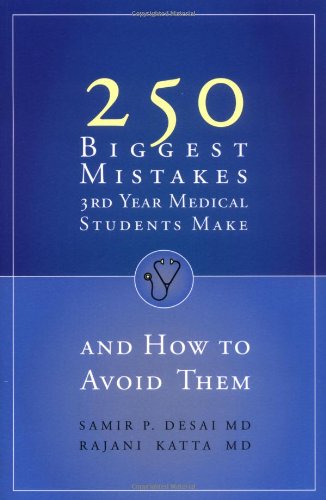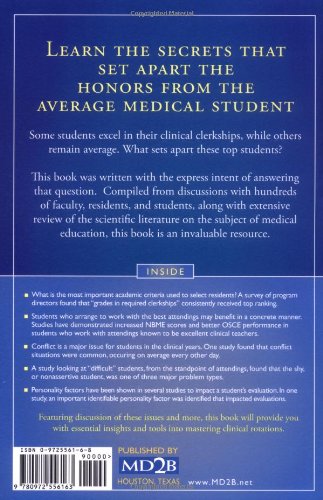Customer Services
Copyright © 2025 Desertcart Holdings Limited



250 Biggest Mistakes 3rd Year Medical Students Make And How to Avoid Them
H**R
not particularly useful
being a good medical student is about learning to be a good physician. this book is more about how to game it as much as possible to get a good evaluation - but the two are not the same and too many students these days spend medical school simply specializing before they even finish!
B**D
Third year Med Student Review
This book really is a great thing to read before starting third year rotations, and it is actually really great to reread halfway through the year to remind yourself what you should be doing (that is what I'm doing now; well I read some of it earlier anyways). It is a really quick read. You can get through it in a night or maybe two. If your school is like mine then about half of your grade is based on clinical evaluations, so its smart to "study" for those just like you would for a test. I had been finding it hard to get good clinical evals but reading this book has given me the confidence that I can do better on internal medicine, and it has made me realize that I had been making a lot of the mistakes listed in the book. Good luck! Buy the book!
D**K
Looking forward to using this
The book has a lot of good information, good for getting a sense of what is expected and insightful tips for being ready right from the start. thanks**After reading this through, I am happy that I purchased the book. Some of the tips come off as common sense, but there are some great tips and pointers to manage your expectations going into clinical rotations as well as information to understand what the doctors expect of you and where they are coming from. I would recommend this book as a should read before stepping into your hospital rotations.
S**M
A Must Before and During The Clinical Years
There is a wide gap between the culture and expectations of medical students during the preclinical years and that of the clinical years. If you want to be ahead of the competition, impress attending physicians from the get go, and not learn everything on rotations by a fiery trial, then this is the book you need. There really is no alternative. Teaching hospitals have their own high-intensity and frequently frenzied cultures and, nearly without exception, expect students to jump right in and be autonomous. If you are a third-yeard student reading this and you don't know what that means--I sure was--you need an extra boost, and this book has it. It goes through everything you need to know to start and function in a new rotation--from how to get that much-needed information and guidance from residents and attendings to what to bring and how to give an excellent presentation, write patient notes, and generally maximize your chances of earning an "honors" grade. For better or worse, there is a right and wrong way to do basically everything in the hospital. This book will steer you where you need to go and is an ideal quick read before the start of rotations. Be wary of the reviews suggesting the information should be intuitive or obvious to you; they are likely written by more advanced medical students. This resource is to give you extra support during the first 3/4 of your third year.
W**N
Ok
I read this book and summarized what it said in 3 pages of typed notes. Basically just read a lot, be friendly and upbeat, and shine in the spotlight any chance you can. Could have been a lot shorter. There are not 250 mistakes but probably 100, as many are repeated and most are obvious mistakes you would already know about. I'd compare it with tarascons or nerds guide to prerounding.
Trustpilot
5 days ago
3 weeks ago